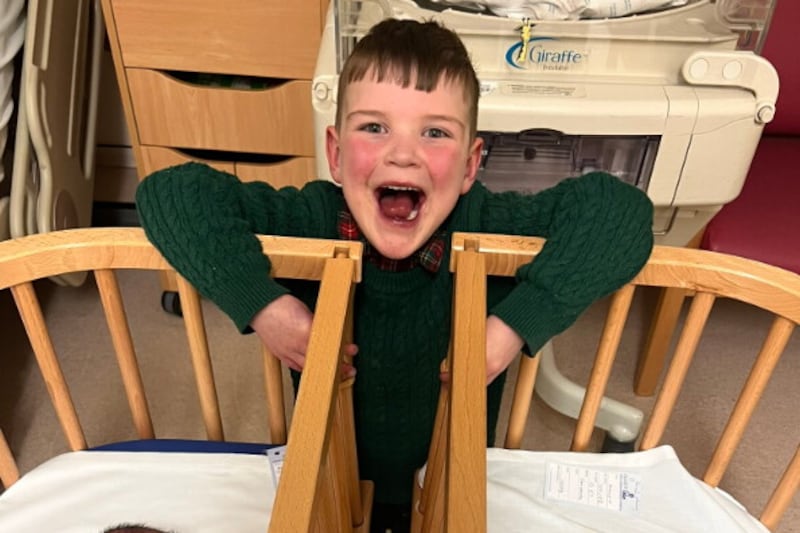A Moira woman who received a life-changing kidney donation has urged families not to avoid important conversations about their health.
Speaking to The Irish News, Patty Gilbert (67) said she was given her kidney in 2016 when a woman in England died after an accident.
She now writes to the woman’s son, forever grateful for the chance to recover her health and enjoy life.
As chair of the Northern Ireland Kidney Patients’ Association, she will be among many attending Stormont on Thursday to mark a new law on organ donation coming into effect.
Read more
Dáithí’s law, named after six-year-old Dáithí Mac Gabhann from west Belfast, means all adults in Northern Ireland will be considered potential organ donors unless they opt out or in an excluded group.
Still waiting for a heart transplant, the young boy’s family successfully campaigned to have the law passed at Westminster after Stormont collapsed.
Chronic kidney disease has been in Mrs Gilbert's family for two generations, with her father receiving his own kidney transplant in 1980.
“My dad was a farmer and we’ve seen how debilitating it was needing the assistance of neighbours and family to run the farm while he was ill,” she said.
Inheriting the condition, Mrs Gilbert had only needed annual hospital trips before her own renal function seriously declined.
“One of the main things is chronic tiredness. That’s not about a lack of sleep, no matter how much rest you have the body just does not cooperate," she said.
“The kidneys don’t clean the blood well enough and toxins build up. That has massive repercussions for how the body functions day to day.”
Before receiving her donor, she said the family largely kept their medical condition private.
“We don’t want to be defined by it, but it comes to define us quietly and assiduously bit by bit.”
After the exhausting requirements of kidney dialysis, she said talking to family and friends about organ donation was difficult.
“I never asked anyone at all, but in talking about it I felt that I was putting pressure on family and friends so I stopped talking about it," she said.
“It turned out that my husband, our children and two friends offered to be tested."
Even though her husband was identified as a match, a risk to his health was identified and the operation couldn't go ahead.
"The consultant asked me if I was disappointed. My response was ‘absolutely not,’ because they had promised they would take no risks with my husband. I found that to be extremely reassuring.”
While others can wait on the organ donation list for years, Mrs Gilbert's match was found around 70 days later.
“I received a kidney from a lady in England who died very suddenly after a most unexpected accident," she said.
“I’ve had the pleasure since then of being able to write to her son, and have maintained communication with him twice a year.
“It has been an absolute delight to say to the donor’s family, ‘thank you, you have given me life again'."
The family had been asked about donation while their mother was still attached to life-support machines.
"I can’t imagine anything more devastating in the face of the loss, grief and trauma of all of that,” she said.
“They said yes, and that is altruistic love and thought for your fellow man beyond measure and I’m eternally grateful.”
She recalled the impact on her health was nearly instantaneous.
“I felt a change within days, even within 24 hours. The discomfort of surgery was nothing compared to seeing beautifully coloured urine in the urinary bag at the side of the bed," she said.
“To know that kidney was functioning from the moment that surgeon put it into your body and plumbed it up.
“There is no better gift.”
Writing a letter to thank the family on the same night she was released from hospital, she waited six weeks to post it out of respect.
The family told her they were “immensely proud of their mum and their wife,” and later found out she had wanted to be an organ donor.
“That meant so much to them. They felt it fulfilled their mother’s wishes," she said.
She went on to praise Dáithí Mac Gabhann’s family for their “tremendous” success.
“Dáithí’s family have been very brave in exposing their personal situation to the public eye," she said.
“He’s growing into such a lovely young fella, but we also know he needs close care of a medical team.
“They are to be commended for all the work they’re doing for him and other children waiting for heart transplants. They have raised the profile of organ donation in a tremendous way.”
Hopeful the new opt-out system will save lives, she said it was also crucial for families to share their wishes on organ donation.
“It will certainly make things easier for people if they know their deceased relative was in favour of organ donation or had even withdrawn their consent.
“There are conversations in life that we all must have with our family and this is one of them.”








